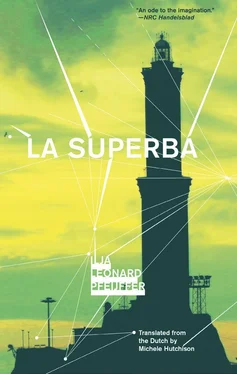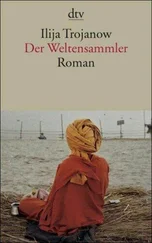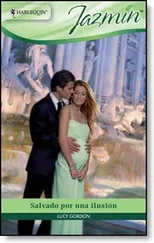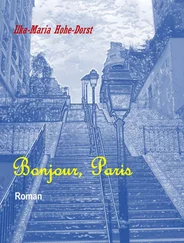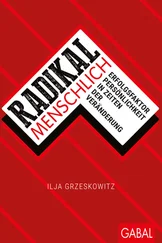What’s more, I began to realize that the story of the mass Italian emigration was enormously connected to this city. The Genoese and other inhabitants of Liguria were pretty much the pioneers. They were overrepresented in the first wave of emigration. Their favorite destination on the paradisiacal continent La Merica was the mysterious Land of Silver. They settled in large numbers in a district of Buenos Aires they called Boca, after their beloved fishing port, Boccadasse, which by now has been swallowed up by the city and is part of the Genoa Sturla area, but has lost none of its idyllic pull. Supporters of Boca Juniors, one of the big famous football clubs from that part of Buenos Aires, still called themselves “Zeneisi”—Genoese in Genoa dialect. The famous song “ Ma se ghe pensu ,” the nostalgia-drenched anthem of all Italian emigrants, is sung in Genoese dialect. The story goes that the Genoese immigrants in Buenos Aires invented jeans. That’s why they are called jeans — a bastardization of the word “Zeneise.” I’d heard that story before and naturally I’d never believed it, but it seems it’s true. I’ve found various reliable sources that confirm this.
But later, too, when the Genoese were less inclined to leave and when the emigrants from other parts of Italy arrived, their story remained linked to this city. Almost two thirds of all Italian emigrants set sail from Genoa for the journey of their lives, the passage from poverty to the promise of a new and better existence. Each day, thousands of desperate people waited on the quaysides at this city’s port for a chance to board one of the large ocean steamers that were called passenger ships but more closely resembled freight ships with human cargo. The stench and the sanitary conditions in third class were notorious. Concerned physicians wrote alarming articles about it at the time. Passengers contracted terrible illnesses during the weeks-long crossing. Many didn’t survive it.
And for all those thousands on the quays, it was the ultimate dream to gain access to this hell in the belief that the hellish journey would culminate in the paradise called La Merica. They stood, sat, and lay down here to wait, sometimes for days on end. Farmers, artisans, beggars, rogues. Their few paltry belongings with them. They spent the nights on their duffel bags or simply on the ground among the rats. Some of them could afford a place in one of the long, underground dormitories or in an attic without light or fresh air. They were hungry. They’d been hungry all their lives anyway, but here at the Port of Genoa the prices for even the simplest foods reached astronomical heights due to the enormous demand. The Genoese are good but they are not crazy. If you have that many hungry, poor wretches lying on your streets, of course you’re going to ask a pretty price for your bread. You have to feed yourself at the end of the day. A Zena a prende ma a non rende , as the old saying goes. Genoa takes and gives nothing for free.
They arrived in the new world, destitute and broken, where they had to fight for their lives afresh against the gangsters, Mafiosi, slumlords, brothel keepers, high and lowlifes who were waiting to take advantage of them again with a big smile on their lips. The official website of the research institute for Italian emigration to both Americas emphasizes that the Italian emigrant was characterized by pride in his fatherland and an unwavering belief in human progress based on work and a strong awareness of civilian virtues and religious piety. It’s actually there in black and white. This is comparable with the things I’ve sometimes heard right-wing Italian politicians say: the Italian emigrants went in order to work, while the African rabble flooding Europe have only come to steal. And then to think that the research institute is financed by the province, which since time immemorial has been in left-wing hands, you can just imagine.
I feel more and more like spending time in the archives excavating letters and diaries that reveal how things actually were, which not one Italian institute would dare put on its website. I don’t know if it’s going to result in a new play, like Walter wants, but perhaps it might, who knows, why not? In any case the material could be useful when I rework these notes I’m regularly sending you into a novel in which immigration and emigration need to be the major themes.
7.
Yet Walter’s proposition kept bugging me. I mean, of course it was too ridiculous for words. As an ambition, it was a long way from anything I’d ever envisioned for myself and was, in practical terms, completely unrealistic. Where was I supposed to find the money to buy a theater? My financial situation in general wasn’t rosy and at the moment it might even be called dire. And Walter didn’t have any hidden reserves, either; I didn’t even have to ask him to be very certain of that. I’d paid for his beer in Zaccharia.
But Walter was a professional optimist and he told me not to look at it all that way. Money wasn’t the problem. We’d find a solution for that. “It’s a rare opportunity, Ilja. Have you seen how that theater’s outfitted? I’ve worked in big theaters in Germany, England, and Spain that had less than half the resources. You have to imagine all the things we could do there, you and me, with our different backgrounds and talents. We’d quickly become the most talked about theater in Genoa — we’d make sure of that, right?” He slapped my shoulder with a broad grin.
“And yet we can’t completely ignore the question of the money, Walter.”
“No, of course not. But you don’t understand a thing. We’ll actually make money from it. I figured that all out long ago. Otherwise I never would have gotten you involved. It’s a goldmine. Just think. Open seven days a week, and everything’s possible: not just plays, but music, cabaret, jazz, cinema, you name it. And at the end of the night, away with the chairs and the stage and BOOM — dance parties with the best DJs! And all that time the restaurant will stay open. Not to mention the bar. Ha! We’ll cover the acquisition costs one way or another. If necessary we’ll borrow. It’s only a temporary investment. We’ll have it paid back within half a year. And then we’ll be talking. We’re going to be rich, Ilja, you and me, in this fantastic place, with our talents.”
“Or we’ll find someone to invest on our behalf.”
“Or we’ll find someone. Exactly. We just need to put together a good business plan. Anyone with a bit of sense in their heads will see immediately that with the right artistic management, this could be a gigantic success. So you’re in? Let’s agree on this. Let’s in any case go and talk to the owners and see what they are actually asking for it. Then we’ll see. Alright? I have to go now. Can you pay for my beer? I’ll talk to you later.”
I had my doubts about the guaranteed riches that would rain down on us as soon as we had the keys to the joint, but I had to admit that I didn’t entirely disagree with Walter. There was potential for a successful commercial operation. I could see that. It would be hard work, certainly at the beginning. But as soon as we’d built up a name, we’d grow automatically as long as we continued to deliver quality. I could use my connections back home. I counted among my friends some of the most excellent actors, musicians, and composers in Europe. I’d worked with them. That would be possible here too. They’d be happy to come to Genoa. And Walter had a wealth of international contacts. We’d be able to exploit that fact and our international orientation would make us stand out from the other theaters in the city.
I had to admit that the idea of having a source of income here in my new fatherland, especially over the long term, wasn’t unattractive, certainly in light of my precarious financial situation. And there was another matter. Working here would mean putting down roots. Instead of just staying here, living off pen, paper, and my imagination, which in principle would be possible in any other place in the world, I’d have a role and a mission that were directly connected to this city. The idea pleased me. I was also receptive to the thought of being able to give something back to the city that I had so much to thank for. Of meaning something to the one who meant so much to me. And apart from that, there was another thought that I tried to suppress but that kept raising its head — I’d be a theater director. The idea alone appealed to my vanity. They’d be impressed by that back home. And all those failed thesps in Zaccharia would finally take me seriously.
Читать дальше
